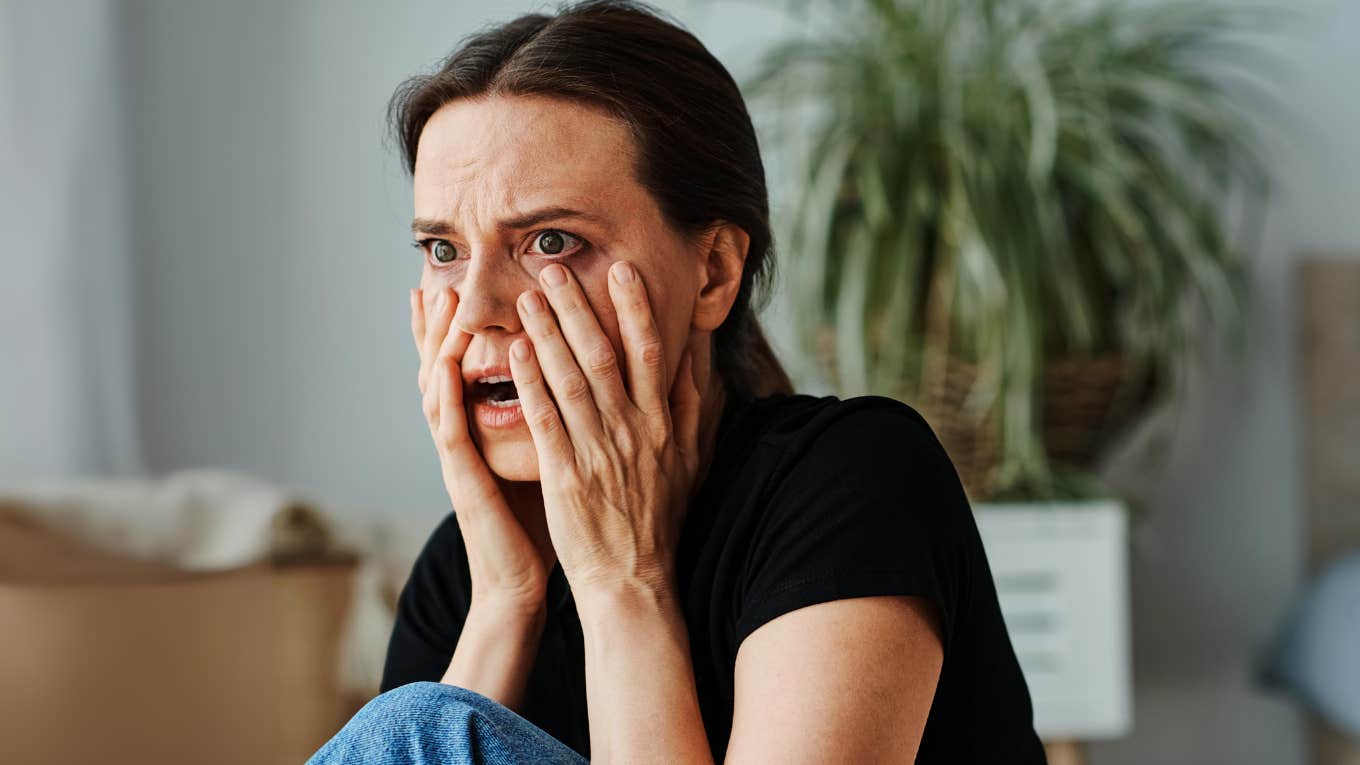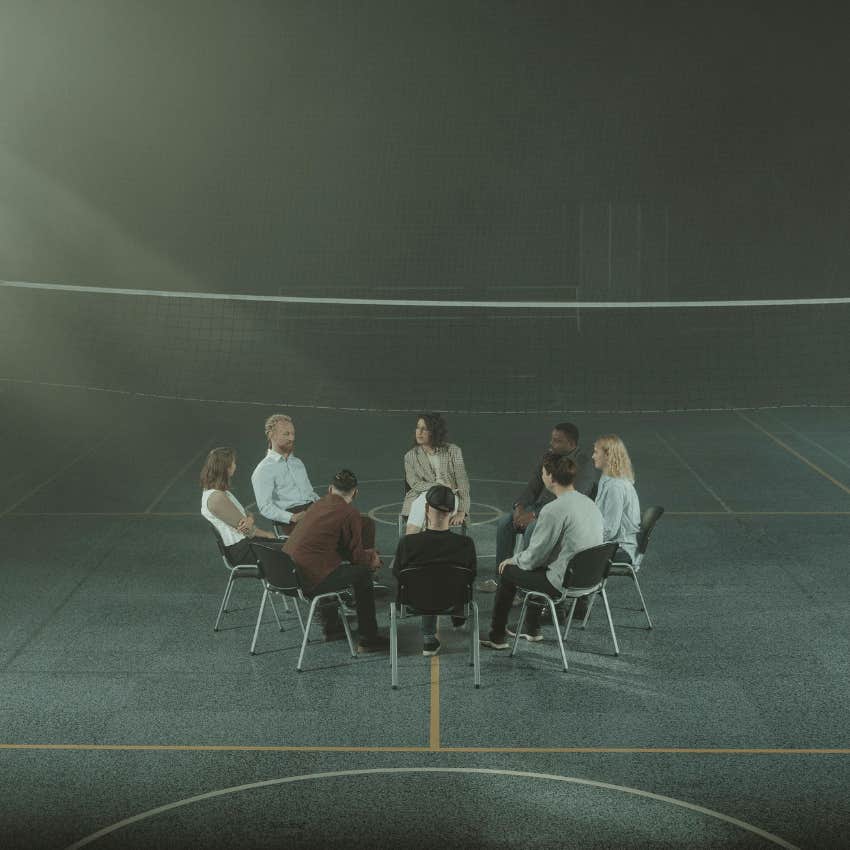Clinical Psychologist Admits She's A Hypocrite When It Comes To Her Own Mental Illness — 'What Will My Patients Think?'
My own patient’s intake forms have often been shorter than my own.
 LightField Studios | Shutterstock
LightField Studios | Shutterstock My recent move to another state is necessitating that I find new doctors. Finding new doctors means filling in endless forms with health questions ranging from the smallest, silliest details to one tiny line allocated to describing the absolute worst, long illness of your life.
The new forms litter my desk. There’s the “easy” stuff — the asthma, the allergies, the arthritis, the gallbladder, the C-section. I know the hows, whens, and why’s of them.
I’m not happy about them, but I have weathered their storms, and they don’t define my identity. I have spent entire rides with Uber drivers, unselfconsciously sharing the personal details of our shared maladies.
Then there’s the stuff that’s not so easy.
Over time I have learned more and more how to deal with reporting my mental illnesses themselves, as well as my feelings about having the illnesses.
How do I do justice to words like Bipolar 2, Major Depression, Panic Disorder, therapies, ECT, and the handful of pills I count out in the night to get me through the next day? How do I say, “Yeah, I’ve had all these things, but I’m “fine” now?
I alternate between leaving long blank spaces or providing a level of detail that as a psychologist, I could have included on one of my own patient’s intake forms.
I tell myself that the details on my medical forms are in the service of being “helpful.” After all, the comorbidity of mental illnesses and other health problems is significant and could be important to include, especially as I get older. It’s a similar deal with my meds. But that’s not really true.
 Alex Green | Pexels
Alex Green | Pexels
My real reason is to communicate my mental illness so straightforwardly that I protect myself.
I want to appear “in control,” “above it all.” I want Kryptonite that will deflect any stranger’s judgments that I must be a basket case. “Hey, I’m a psychologist. I take all of this in my stride. And I probably know more about mental illness than you.”
This works with about 25% of physicians. We engage in a reciprocal exchange about the relevant facts of my illness, the current research, and their openness about talking with my psychiatrist. Several have briefly described their struggles.
The other 75% either make no bones about their ignorance or disinterest in psychiatry. Or they may establish themselves as experts, with no real evidence of it. They dole out the kind of advice that can be found in the Reader’s Digest.
Without proposing a consultation with my psychiatrist, they spout off alternative theories and treatments to the ones that are already working for me. Not even when I am not seeking their help with anything related to mental illness.
I have been warned by doctors, nurses, aides, and receptionists against Electroconvulsive Therapy (ECT), even though I’ve made it clear that it’s the one true thing that has saved my life. I walked in with a fever of 102 and was told that I would be less depressed if I got more exercise. I believe this is true, but not with a hacking cough for a month.
These “interventions” are usually delivered with an air of expert kindness, that is often patronizing. Almost all of my presenting problems are seen through the lens of psychiatric diagnoses. I want to comment, “I beg your pardon, but when was the last time you read anything remotely related to mental illness?” But I don’t.
The illnesses themselves are stigmatized, and so are the providers. It’s like the degree of difficulty of mental health care is assumed to be far below many other medical interventions. I have a psychiatrist, but the necessity of including him in a relevant medical condition does not impress them.
Over 30 years, I’ve become more comfortable disclosing my struggles with mood and anxiety disorders, so comfortable that I’ve written and spoken extensively on issues of education, advocacy, and personal experience.
I have been humbled by the healing power of the stories my fellow sufferers and I share. But there's one thing that leaves a large space on the forms. It’s the “paranoid psychosis” thing of eight years ago. My first impulse is to leave it out. But because it was caused by a thorny combination of lithium intoxication and the dangerous interaction of several drugs, I know it belongs in my record.
One morning, I woke up inexplicably on an inpatient psychiatric unit. I knew I was in the wrong place, so I gathered up my stuff and headed for the door. A security guard stood with his arms crossed under a sign that announced, “Elopement Risk.” I wondered what that was all about.
The guard blocked my way. I explained the mistake. He grabbed my arm. I cursed at him and struggled. Finally, a nurse came over and asked me what I thought I was doing.
“I’m going home.”
“No, you aren’t. You are staying here.”
“I need to call my family,” I insisted.
“OK, call them.”
My sister came on the phone. I told her I was being held against my will, and that she needed to come get me. She explained to me that I had gotten sick and that I needed to be in the hospital. What?
I hung up on her and went down the long list of family members. They all sounded funny, and no one would tell me what I had done to land in the hospital against my will. It must have been pretty bad. I paced for hours until it became crystal clear that my family wanted to kill me, and they had hired the staff to do it.
My first thought was that they would poison me. I refused meals and lived on individually wrapped snack foods. When the staff sat with me and cajoled me to eat, I was certain the food was tainted.
Based on a “code” in blue lights, and the sounds of helicopter wings whirring every night, I was convinced that the murderers were coming for me, with plans to kill me and drop my body into the Chesapeake Bay. I remained awake and hypervigilant, and I counted their shoes as they came close to my room.
But something went wrong every night. There were too many people in the helicopter, they ran out of gas. I slept from 3 to 5 am when one of the ringleader nurses slapped a blood pressure cuff on me and announced, “It’s another beautiful day!” She taunted me continuously.
I discovered multiple conspiracies on the unit, like the student nurses were cosmetologists-in-training, who were trying to bilk the old ladies out of their money with their crappy products. When one of them sat by me and asked if she could hear my “story,” I replied, “Get the fuck away from me!” I instantly regretted my show of emotion because I knew it would be used against me.
They began to bring unfamiliar nurses in at night. As they gave me my meds, they patted the shining scalpels that shone through their pockets. Enough said.
I had never felt so desperately alone. Never so dangerously vulnerable. By the tenth day, I was so beaten down, that I lamented, “Oh God, I’m still alive,” each time I awakened.
What was happening was real. I told no one about these plots against me, for fear that their reactions would escalate. My mind was consumed with attention to every single thing that could be a threat to me. Three weeks of screaming, silent hell passed. The staff said I was doing much better. Whatever that meant.
But what about my family? I started to believe that they would never conspire to kill me. I was discharged with the same confusion about why I’d been confined in the first place. I kept myself from even the closest member of my family, convinced that I could easily land back in the hospital if I said the wrong thing.
Over the next weeks, I began to reflect upon my beliefs in the hospital and I’d think —Wait a minute, that couldn't have happened. The emergence of doubt saved me, as it does to people recovering from delusions. But the emotion was so real. Sometimes it is still so real that I shiver.
 Tima Miroshnichenko | Pexels
Tima Miroshnichenko | Pexels
Early in my training, I was assigned to lead a therapy group that was the last choice of any of the trainees. It had a wild reputation, and the members were a combination of manic, schizophrenic, and psychotic sufferers — guys who only came because a decent lunch followed group participation.
One afternoon, when it seemed like everyone was decompensating at the same time, my favorite guy flatly delivered a line that has always stayed with me, “Hey Doc,” he quipped, “Call the police. We’re out of control.” There are times of personal upheaval when I repeat those words to myself. They always make me smile.
We finally found a way to help our group feel in control by identifying life skills to explore. So much stood between them and the seemingly “simple” coping tools that make life easier.
I stole a phone, and we took turns calling imaginary places and initiating a call with our requests. One day, a young guy was preoccupied with what were auditory hallucinations. I asked one of the top 3 stupid questions of my clinical life. “Tom, are you having your own thoughts?”
He was so surprised, that he just looked at me, shrugged, and answered matter-of-factly, “Yeah.” He was aware enough of what was happening, but his internal experience was insistent and private. It was as if he was caught between two worlds, and I had to respect that.
I was having my own thoughts. Except I didn't know they were only mine. The joke was on me. And I still don't know the punchline. All I knew was there was a red line of stigma between mood disorders and psychosis, paranoia, and delusions.
Yes, I know the enlightened party line and I know the “right things” to say about mental illness — it's not my fault — but that is no comfort.
“Losing my mind” was the worst thing to happen in my life. I don't know how it happened. So, I don't know how to prevent it from happening again. I know the scientific psychopharmacology underpinnings of my disaster. But it doesn’t erase the emotional experience of it.
In the cruelty of severe mental illness, our boundaries dissolve. The membranes that hold us together, lose their tenacity. We are adrift in a solar system of suffering. Our once brave, beautiful brains lose their capacity to direct us. Comfort is a foreign concept.
How do we manage even the smallest details of lives that spin out of our control? We don't even know friends from foe. Can love be trusted? We are aliens, known by everyone but ourselves. Will the essential nature of our being ever return? Will we know when it does?
I remember that time with jagged sharpness. I try to forget it on purpose.
Sometimes I feel so 'crazy' when it comes to me but at other times, I feel singularly enriched in wisdom and the grace that comes with survival.
A 2022 study found that the prevalence of mental disorders, including addictions, has increased during the COVID-19 pandemic and is likely to remain at high rates in its aftermath. Until now, healthcare providers have been consciously or unconsciously trained to prioritize caring for others instead of self-caring. Difficulties in seeking help when needed should be addressed during the undergraduate period and throughout their professional career.
My doctor’s appointment is this afternoon. I think, for now, I will keep my story to myself. Until I know he is worthy of it.
Martha Manning PhD is a clinical psychologist and writer. She has published five books, written for the New York Times, the Washington Post, Readers Digest, Psychotherapy Networker, Ladies Home Journal, Harpers Bazaar, and written 400 stories for Medium. She has been featured in People magazine and USA Today. With Mike Wallace and William Styron she was featured in the Emmy nominated HBO documentary, Dead Blue.

